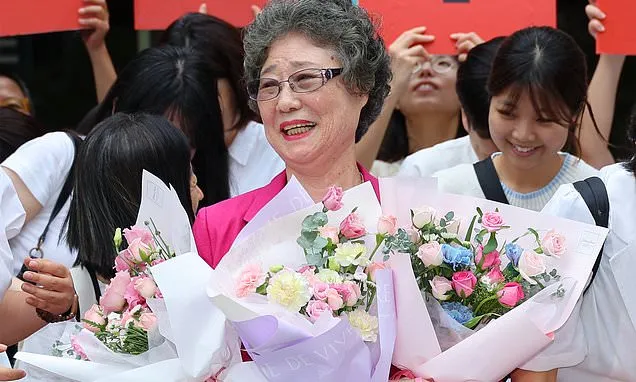A woman who was convicted 61 years ago for biting off her rapist's tongue while he attacked her has been acquitted after a court revisited her decades-long conviction.
Choi Mal-ja was sentenced to 10 months in prison suspended for two years for grievous bodily harm, after taking off 1.5 cm (0.59in) of her attacker's tongue in an attempt to escape when she was 18-years-old.
Her aggressor, a 21-year-old man identified only as Roh, attacked her in the southern town South Korean town of Gimhae in 1964. He violently held her down on the ground and forced his tongue into her mouth, even blocking her nose to prevent her from breathing.
After the assault, Roh received the lighter sentence of only six months, suspended for two years. In a ruling that rocked the East Asian country, the charge was for trespassing and intimidation - not attempted rape.
But after a years-long campaign to clear her name, Choi, now 79, has been acquitted by a Busan district court which ruled her actions 61 years ago were 'justifiable self-defence'.
In the first hearing of the retrial in July, prosecutors apologised to Choi, and in a rare move, asked the court to quash the conviction.
Her actions decades ago which landed her a prison sentence are now 'deemed an attempt to escape an unjust infringement on her bodily integrity and sexual self-determination', the court said in a statement.
'I could not let this case go unanswered... I [wanted] to stand up for other victims who share the same fate as mine,' the 79-year-old said after the historic acquittal.
Choi Mal-ja was sentenced to 10 months in prison suspended for two years for grievous bodily harm, after taking off 1.5 cm (0.59in) of her attacker's tongue in an attempt to escape when she was 18-years-old.
Choi Mal-ja receives bouquets at a district court in Busan, South Korea, 10 September 2025.
She challenged the court's ruling after being inspired by the country's #MeToo movement.
She described how people along the way encouraged her to drop the case, but still she persisted.
'People around me warned me that it would be like throwing eggs at a rock, but I could not let this case go.'
Part of the reason she carried on fighting for justice was to stand up for other women who have experienced violence.
'Sixty-one years ago, in a situation where I could understand nothing, the victim became the perpetrator and my fate was sealed as a criminal,' she said in a press conference after the ruling.
'For the victims who shared the same fate as mine, I wanted to be a source of hope for them.'
At the original trial in 1965, the court found Choi's actions had 'exceeded the reasonable bounds of legally permissible self-defence'.
Both the police and later the judge distrusted her testimony, asking Choi in court whether she had any affection for the man and suggesting she should marry him.
She was in jail for six months during the investigation until a judge sentenced her to 10 months in prison, later suspending the sentence. Her attacker, Roh, repeatedly demanded compensation for his injury and even broke into Choi's home armed with a kitchen knife.
The case has been used as an example in South Korea's law textbooks to illustrate how a court can fail to recognise self-defence during sexual violence.
Choi began her journey to seek justice in 2018 after being inspired by the #MeToo Movement, which had also taken hold in South Korea. She spoke to the Women's Hotline and began gathering evidence for her appeal.
But the path to exoneration was tough. When she filed for retrial in 2020, lower courts initially rejected her petition.
Finally, in December 2024, the Supreme Court accepted her case and ordered a retrial - leading to her long-awaited acquittal.
Outside the court on Wednesday, supporters held placards in support of Choi that said: 'Choi Mal-ja did it!' and 'Choi Mal-ja succeeded.'
Choi's lawyer, Kim Soo-jung, said her client plans to file a civil lawsuit against the state to seek compensation for the damages she suffered from her conviction 61 years ago.
